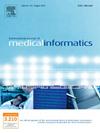Serious Games for constipation management for people with intellectual disabilities: A scoping review and narrative synthesis
IF 3.7
2区 医学
Q2 COMPUTER SCIENCE, INFORMATION SYSTEMS
International Journal of Medical Informatics
Pub Date : 2025-02-09
DOI:10.1016/j.ijmedinf.2025.105832
引用次数: 0
Abstract
Introduction
People with intellectual disability (PwID) are 2% of the UK population. Constipation and bowel movement (BM) problems (diarrhoea/faecal incontinence etc.) affects over a third of PwID and is a serious cause of morbidity and mortality. Pw ID rely heavily on outside support (family/professional carers/healthcare professionals), many of whom are ignorant to bowel related harms. There is significant stigma to discuss BM particularly constipation.
Serious Games (SG) are increasingly used for education of health needs. This review examines if game-based technology can assist improving knowledge and reducing stigma of BM problems particularly constipation.
Objective
To identify and gain evidence of SGs aimed at improving knowledge of BM management particularly constipation.
Methods
A systematic search of publications between 2010 and 2024 was conducted following the PRISMA ScR statement for scoping reviews. The search inclusion/exclusion criteria were designed and overseen by an information specialist. PUBMED, EMBASE and PsychINFO databases were searched. Extracted variables included SG title, co-production and expert involvement, target outcome, evaluation methodology, effectiveness, sustainability and game platform. Results were narratively synthesised.
Results
Of 2966 papers retrieved, three were selected for inclusion, none RCTs. All three included SGs aimed to teach BM management or recognition to healthcare workers/ professionals. Two studies evaluated game efficacy. No SGs were assessed after initial trials, none were implemented in clinical practice. Only one game successfully improved participant knowledge. All game creators consulted experts during game design, but none consulted patients. None discussed reducing stigma amongst their audience.
Conclusion
Only one of three SGs identified improved BM knowledge in healthcare workers/professionals and was not specific to PwID. There is potential to co-produce with PwID and their carers a SG to support BM problems particularly constipation to reduce stigma, improve outcomes and be a templar for other similarly vulnerable groups like those with dementia.
针对智障人士的便秘管理的严肃游戏:范围回顾和叙述综合
智障人士(PwID)占英国人口的2%。便秘和排便(BM)问题(腹泻/大便失禁等)影响了三分之一以上的PwID,是发病率和死亡率的严重原因。Pw严重依赖外部支持(家庭/专业护理人员/医疗保健专业人员),其中许多人对肠道相关危害一无所知。讨论BM尤其是便秘是一种耻辱。严肃游戏(SG)越来越多地用于健康需求教育。这篇综述研究了基于游戏的技术是否可以帮助提高知识和减少BM问题的耻辱感,特别是便秘。目的鉴别和获取SGs证据,提高对BM管理特别是便秘的认识。方法根据PRISMA ScR声明对2010 - 2024年间发表的文献进行系统检索,进行范围评价。搜索纳入/排除标准由一名信息专家设计和监督。检索PUBMED、EMBASE和PsychINFO数据库。提取的变量包括SG名称、合作制作和专家参与、目标结果、评估方法、有效性、可持续性和游戏平台。结果被叙述合成。结果在检索到的2966篇论文中,3篇入选,无rct。这三个项目都包括SGs,旨在向医护人员/专业人员教授BM管理或认可。两项研究评估了游戏的功效。在初始试验后没有评估SGs,没有在临床实践中实施。只有一个游戏成功地提高了参与者的知识。所有游戏开发者在游戏设计过程中都会咨询专家,但没有人会咨询患者。没有人讨论过如何减少观众的耻辱感。结论3个SGs中只有1个发现卫生保健工作者/专业人员的BM知识有所提高,而不是针对PwID的。有可能与PwID及其护理人员共同制作一份SG来支持BM问题,特别是便秘,以减少耻辱感,改善结果,并成为其他类似弱势群体(如痴呆症患者)的典范。
本文章由计算机程序翻译,如有差异,请以英文原文为准。
求助全文
约1分钟内获得全文
求助全文
来源期刊

International Journal of Medical Informatics
医学-计算机:信息系统
CiteScore
8.90
自引率
4.10%
发文量
217
审稿时长
42 days
期刊介绍:
International Journal of Medical Informatics provides an international medium for dissemination of original results and interpretative reviews concerning the field of medical informatics. The Journal emphasizes the evaluation of systems in healthcare settings.
The scope of journal covers:
Information systems, including national or international registration systems, hospital information systems, departmental and/or physician''s office systems, document handling systems, electronic medical record systems, standardization, systems integration etc.;
Computer-aided medical decision support systems using heuristic, algorithmic and/or statistical methods as exemplified in decision theory, protocol development, artificial intelligence, etc.
Educational computer based programs pertaining to medical informatics or medicine in general;
Organizational, economic, social, clinical impact, ethical and cost-benefit aspects of IT applications in health care.
 求助内容:
求助内容: 应助结果提醒方式:
应助结果提醒方式:


